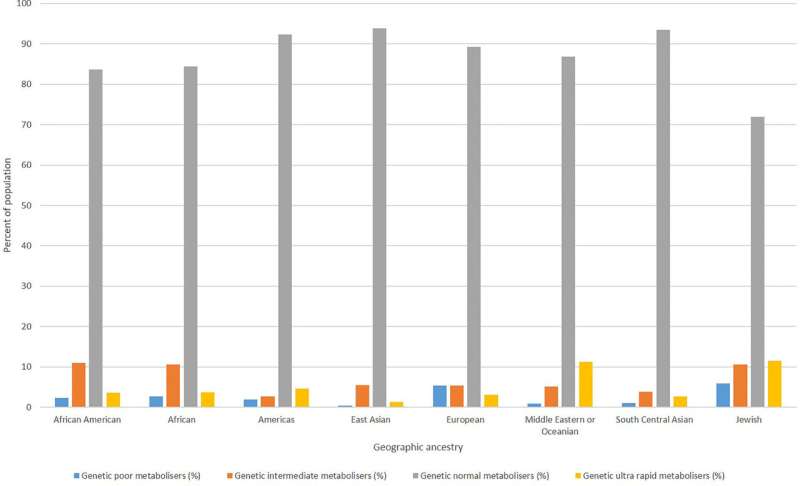This article has been reviewed according to Science X's editorial process and policies. Editors have highlighted the following attributes while ensuring the content's credibility:
fact-checked
trusted source
proofread
New study challenges belief that opioids are effective at treating cancer pain

The world's largest review on opioid medicines for cancer pain has found it is unclear whether some commonly used opioid medicines are better than a placebo and suggests that non-opioid medicines, including aspirin, may be as effective as opioids.
Researchers examining the data on opioids for pain caused by cancer have found surprisingly large gaps in evidence regarding the actual benefits of these medicines for cancer pain. The study challenges the commonly held view that opioids are the most potent pain relievers.
The paper is published in the CA: A Cancer Journal for Clinicians.
The study, led by The University of Sydney and including The University of Warwick, highlights that there is no "one size fits all" treatment approach for cancer pain, urging health professionals and patients to carefully weigh up the evidence when deciding on a suitable pain management plan.
Opioid pain relievers are the most common treatment for cancer pain management. Many international guidelines, including the World Health Organization, recommend opioid medications to manage background cancer pain (constant pain) and breakthrough cancer pain (temporary flare-ups of pain in addition to background pain).
However, the study found that very few trials have compared commonly used opioid medicines such as morphine, oxycodone, and methadone with placebo.
Neither did it find convincing evidence that morphine was better or safer than other opioid medicines for background cancer pain outside of end-of-life care. This is despite morphine being widely viewed as the "gold standard treatment" for cancer care by physicians and recommended in many international clinical guidelines for moderate to severe cancer pain because of its low cost and accessibility.
The review also found that non-steroidal anti-inflammatory drugs (NSAIDs), including aspirin and diclofenac, may be as effective as some opioids for background cancer pain.
"People with background cancer pain may have an overall better life experience if there is less focus on using opioids to reduce their pain level," says co-author Professor Martin Underwood from the University of Warwick.
"The lack of evidence comparing opioid medicines to placebo for cancer pain probably reflects the ethical and logistical challenges associated with carrying out such trials. Yet these trials are necessary to guide clinical decision making," says lead researcher Dr. Christina Abdel Shaheed from the University of Sydney School of Public Health, Faculty of Medicine and Health and Sydney Musculoskeletal Health, an initiative of the University of Sydney, Sydney Local Health District and Northern Sydney Local Health District.
"In practice, opioids are indispensable for intractable pain and distress at the end of life. What is worth highlighting is that non-opioids, particularly NSAIDs, are surprisingly effective for some cancer pain and may avoid the problems of dependence and waning opioid analgesia over time," says co-author Professor Jane Ballantyne from the University of Washington School of Medicine, U.S.
"The hope is that the findings can help guide doctors and patients to choose between different opioid treatments for cancer pain and empower individuals to consider alternatives if they are unable to tolerate opioid medicines or choose not to take them," said senior author Dr. Mark Sidhom, from the Cancer Therapy Centre, Liverpool Hospital, Australia.
Key findings:
The study examined data from over 150 published clinical trials.
- There were very few trials comparing opioid medicines to placebo.
- Of the placebo-controlled trials, there is moderate certainty evidence tapentadol works better than placebo for background pain caused by cancer.
- Opioids commonly thought of as weaker (e.g., codeine), or NSAIDs such as aspirin, piroxicam, ketorolac, diclofenac, and the antidepressant medicine imipramine may be just as good as "powerful" opioids for background cancer pain, with fewer side effects.
- For breakthrough cancer pain, fentanyl used as a nasal spray, under the tongue, between the gum and cheek, or as an oral spray may be more effective than a placebo (although not for regular use). Fentanyl was also associated with more side effects than placebo.
- It is possible that morphine and other opioids may affect how well the body is able to fight cancer. Research is needed to determine whether there are negative interactions between opioid medicines and anti-cancer treatments or the immune system to ensure that pain management does not negatively impact the ability to effectively treat cancer.
- More research is needed, particularly on non-drug interventions for cancer pain management.
More information: Christina Abdel Shaheed et al, Opioid analgesics for nociceptive cancer pain: A comprehensive review, CA: A Cancer Journal for Clinicians (2023). DOI: 10.3322/caac.21823



















